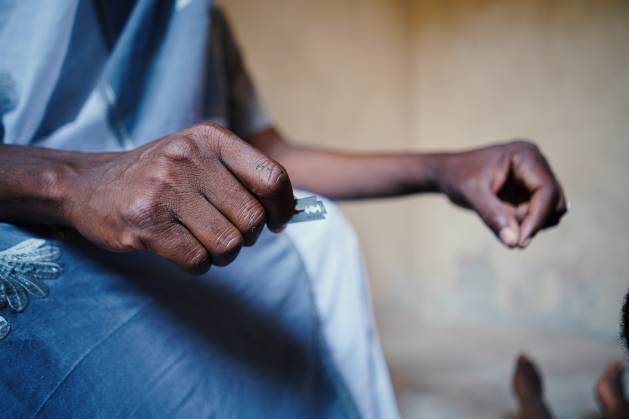To Attain the SDGs, We Must End Female Genital Mutilation — Global Issues
NAIROBI, Oct 20 (IPS) – The tips of our fingers have densely packed nerve endings. That is why a miniscule paper cut activates our pain receptors and causes stubborn pain for a day or two. Now consider that a clitoris has over 10,000 nerve endings. It is the human female’s most sensitive erogenous zone, explaining the sexual pleasure it elicits at the slightest touch. A paper cut on your clitoris would be agonizing yet does not compare to the pain of female genital mutilation – or FGM.
The consequences are devastating and far-reaching, permeating social, political and economic facets of daily life. Consider that the current and future financial cost of health care alone for women living with conditions caused by FGM is USD 1.4 billion annually. Yet, over 4 million women and girls remain at risk of undergoing this violation.
Unlike male circumcision that has been found to reduce transmission rates of HIV and sexually transmitted infections, FGM has no medical benefits. It is simply a function of patriarchy meant to sexually control women. The consequences of FGM are dreadful.
Survivors have spoken out on what sex is like after this heinous mutilation: they feel no sexual pleasure, only excruciating pain. Childbirth is even worse as they are more susceptible to complications, increasing the prevalence of maternal mortality and morbidity by way of obstructed labor, fistula, post-partum hemorrhage, sepsis and ultimately death. The psychological effects are extensive too, resulting in, among other things, depression, crippling anxiety, and even suicide.
Worse still is that the repercussions extend beyond physiology. FGM is often a precursor to child marriage, cutting off the prospects of a girl or young woman actualizing themselves. It is further compounded by conflict and climate crises. In such contexts, bride price is deemed to be an ‘easy escape’ from economic hardships. This false perception makes an already bad situation worse.
In Africa, an estimated 55 million girls under the age of 15 have experienced – or are at risk of experiencing – FGM. This is despite the existence of robust laws and policies that criminalize this violation in at least 28 countries on the continent. For example 50% of these 55 million girls are found in three countries – Egypt, Ethiopia and Nigeria, and all three countries have criminalized the practice. This disregard of the rule of law can be attributed to deeply entrenched cultural dogma, founded on patriarchy that perpetuates the clashing of harmful culture with the legal code.
Additionally, African women and girls in the diaspora, such as those among the 11 million Africans in Europe and 2 million in the U.S., continue to suffer, with little to no legal protections in place. Aggravating this is that undocumented migrants have little recourse, as seeking protection from FGM would expose them to detention and deportation.
Besides, an emerging trend in the fight against FGM is the contention with cross border FGM. This is where communities travel outside of territories with stringent laws that criminalize the practice to carry out the violation elsewhere to avoid prosecution. This is termed ‘vacation cutting’. It is consequently imperative that FGM is criminalized everywhere, for there to be progress towards our shared global sustainable goals.
The fight to end this scourge is made harder by the medicalization of FGM where health professionals conduct the practice in place of traditional ‘cutters’; in a fallacious and inadequate attempt to mitigate the damaging impacts of FGM. In fact, a qualified medical doctor recently filed an application in the High Court challenging the prohibition of FGM, citing criminalization of the practice as a violation of bodily autonomy and an infringement of a woman’s right to uphold her culture. This is a reiteration of the need to double down efforts to eradicate the practice as there are those among us that remain committed to the continued relegation of women and girls, and their entrapment in vicious dependency and poverty cycles in the name of culture.
It is then evident that ending FGM requires an armory of varied strategies. This begins with the understanding that when a country becomes party to an international legal instrument, it consents to limitations to its sovereignty and must therefore fulfil its obligations under international law.
This includes those under African Charter on People’s and Human Rights on the Rights of Women in Africa – commonly known as the Maputo Protocol, for African States; and the United Nations Convention on the Elimination on all forms of Discrimination Against Women (CEDAW), among others. These are important tools towards much needed universal criminalization of and ending FGM.
The world is currently at the midpoint of the sustainable development goals (SDGs) set to elapse in 2030, and all indications point to a completely off-track trajectory – if not regression. If the current rate of progress continues, it could take nearly 300 years to attain gender equality.
While some could argue that it is unrealistic to succeed in 7 years, it is certainly possible to accelerate action and shorten this depressing forecast. We must therefore accelerate action and truly leave no one behind. This means protecting those at risk of this horrendous violation of women and girls. Additionally, a needed increase in financial investments; and it makes financial sense to make them since ending FGM saves economies the costs of the attendant consequence.
The time is now to focus on FGM because while there are ongoing efforts to reform the global financial architecture towards financing for development, these have been heavily centered on climate action. Whilst this is indeed important, the relegation of other goals in this pursuit runs the risk of pushing them – including those on women and girls further to the periphery. These spaces must be expanded towards intersectional collaboration towards financing and meeting our people and planetary goals.
Additionally, there are at least 40 general and presidential elections slated for next year. Fifteen elections are in Africa; 7 in the Americas; 8 in Asia; another 8 in Europe and 2 in Oceania. It is an opportune time for the electorate to demand the inclusion of gender and health rights like ending FGM in manifestos as a start.
People can appraise track records and thereafter hold elected leaders accountable to their commitments including on increased budgetary allocations and transparency in expenditure. Good governance is indeed central to these efforts.
Ultimately, ending FGM requires a concerted effort, a global push with full solidarity where everyone has a responsibility to act. If the rights of women and girls are not prioritized and intersectionality leveraged, as deliberated on at the just concluded International Conference on FGM, we will ultimately fail to achieve Agenda 2030 in its entirety and possibly even our health and gender goals in our lifetime.
Stephanie Musho is a human rights lawyer and campaigner; and an Aspen New Voices Senior Fellow
Hon. Esther Passaris is a Member of Parliament in the Republic of Kenya and a member of the Pan African Parliament
© Inter Press Service (2023) — All Rights ReservedOriginal source: Inter Press Service
Check out our Latest News and Follow us at Facebook
Original Source







